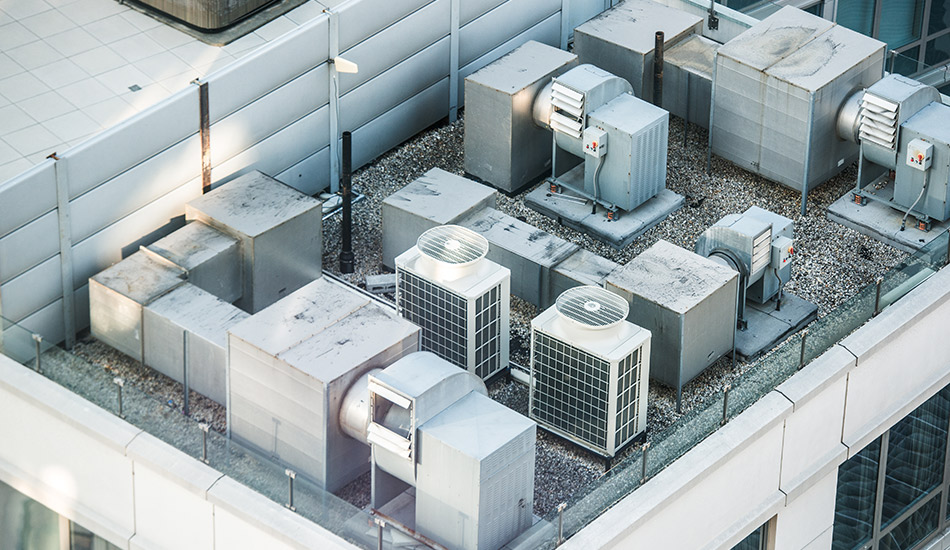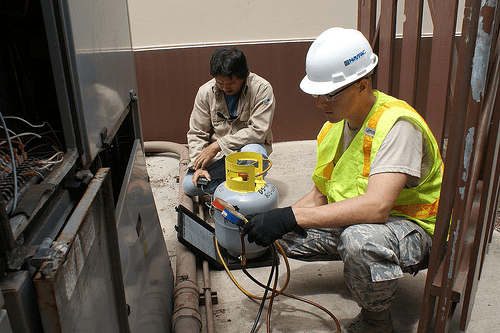Comparing Costs of Repair vs Full furnace replacement
Comparing Costs of Repair vs Full furnace replacement
Blog Article
Choosing In Between a Heatpump and Heating System: Secret Considerations for Your Heating And Cooling Requirements
When examining heating alternatives for a/c requires, the decision between a heat pump and a heater can be intricate. Each system offers distinctive benefits tailored to certain environments and power effectiveness objectives. Recognizing these differences is necessary for making an enlightened option. Key factors such as installation prices and environmental impact even more make complex the choice procedure. Which option absolutely straightens with one's convenience and sustainability choices? The following areas will discover these factors to consider carefully.
Understanding Warmth Pumps: Just How They Function and Their Advantages
While lots of homeowners consider different home heating options, recognizing exactly how heat pumps function and their benefits can considerably influence their decision. Warm pumps run by transferring warmth rather than generating it. In the winter months, they extract warm from the outdoors air or ground and transfer it inside, while in the summer, they reverse this procedure, cooling the home by removing warmth outside. This double functionality makes them functional for year-round climate control.One of the main advantages of heatpump is their power performance. They use significantly less electrical power contrasted to traditional home heating systems, potentially leading to reduced energy costs (heat pump replacement ooltewah tn). In addition, warmth pumps have a smaller carbon impact, making them an eco friendly selection. They likewise need much less maintenance than conventional systems, contributing to long-lasting expense financial savings. Overall, comprehending the auto mechanics and benefits of heatpump can aid property owners make notified decisions regarding their heating and cooling requirements
Checking Out Heating Systems: Kinds, Operation, and Advantages
Heating systems can be found in numerous kinds, consisting of gas, electrical, and oil designs, each with unique functional systems. Recognizing these differences is vital, as they affect effectiveness and heating efficiency. Furthermore, furnaces offer numerous advantages, such as regular warm outcome and dependability in colder environments.
Kinds of Heating systems
Heating unit can vary considerably in design and procedure, with heaters being a prominent option among property owners. There are several sorts of heaters, each making use of various gas sources and technologies. Gas heaters are typical, leveraging natural gas to generate warm effectively. Electric furnaces, on the various other hand, utilize electrical resistance to produce warmth, often preferred for their simple installment. Oil heating systems, while much less typical, work in locations with limited gas accessibility (heat pump replacement ooltewah tn). In addition, condensing heating systems optimize energy effectiveness by capturing and recycling exhaust gases. Each kind runs with a system of warmth exchangers and ductwork to disperse warm air throughout a home. Recognizing the differences between these heater types is important for educated HVAC choices
Advantages of Furnaces
For house owners seeking trustworthy heat during cool months, the advantages of heating systems are substantial. Furnaces supply regular heating, making sure also temperatures throughout the home. They are especially reliable in severe cool, frequently outperforming heatpump in icy problems. Various types, including gas, electrical, and oil heaters, offer versatility to satisfy varied requirements and preferences.Furnaces also have a tendency to have reduced preliminary installment prices contrasted to heatpump, making them a more obtainable option for lots of. Their durable layout adds to a much longer life-span, with several devices lasting over 15 years with correct upkeep. Additionally, modern heaters are typically outfitted with sophisticated modern technology for enhanced effectiveness, which can cause minimized power costs. On the whole, heaters continue to be a reputable option for efficient home heating.

Energy Performance: Comparing Warm Pumps and Furnaces
When contrasting energy effectiveness in between heat pumps and heaters, the Seasonal Power Efficiency Proportion (SEER) plays an essential function in establishing performance. Furthermore, an operational cost evaluation discloses the long-term monetary effects of each system. Understanding these elements can assist house owners in making informed choices regarding their home heating solutions.
Seasonal Energy Performance Proportion
Power efficiency plays a necessary duty in the decision-making process between warm pumps and heating systems, specifically when considering the Seasonal Power Efficiency Ratio (SEER) This statistics measures the cooling efficiency of heatpump over an entire air conditioning period, providing a standardized way to assess performance. Higher SEER ratings indicate better power performance, translating to lower power consumption and reduced utility bills. On the other hand, furnaces are usually examined utilizing the Annual Fuel Use Efficiency (AFUE) ranking, which mirrors home heating effectiveness. When comparing these two systems, property owners ought to focus on SEER rankings for heatpump, as they directly influence overall energy savings and ecological sustainability. An extensive understanding of SEER can significantly influence the long-term satisfaction and cost-effectiveness of the picked cooling and heating remedy.
Operational Cost Evaluation
Understanding the operational prices related to heatpump and furnaces is essential for house owners examining their options. Warmth pumps normally provide higher power efficiency, transforming electric power into heat with marginal waste. This leads to reduced regular monthly energy expenses, especially in modest climates. Alternatively, standard furnaces, especially gas models, might have lower in advance expenses yet can incur greater operational expenditures in time as a result of sustain costs and effectiveness ratings.Moreover, heatpump can function as both heating and cooling systems, potentially lowering the demand for separate cooling and heating devices. While preliminary investments for heat pumps might be greater, their long-term financial savings in energy effectiveness can make them an extra cost-efficient next page option for several families. Careful analysis of neighborhood energy prices is necessary to identify the finest alternative.
Installation Expenses: What to Expect for each and every Heating System
Setup prices for heating unit can vary significantly in between heatpump and heating systems, affecting property owners' choices. Warmth pumps usually have higher ahead of time setup prices, generally varying from $3,500 to $8,000, relying on the unit size and intricacy of installation. This includes the outdoor device, indoor handling system, and needed ductwork adjustments. Conversely, heating systems have a tendency to have reduced preliminary expenses, balancing between $2,500 and $6,000, which can be appealing for budget-conscious home owners. Installation expenses can raise if considerable ductwork is required.Moreover, the choice of gas kind for heating systems-- natural gas, lp, or electric-- can additionally affect setup expenses. While heatpump supply energy performance, their preliminary financial investment might prevent some purchasers. Ultimately, assessing setup prices together with long-lasting cost savings and efficiency will certainly help house owners in making informed choices about their heating unit.
Climate Factors To Consider: Which System Executes Much Better in Your Location
Exactly how do climate conditions affect the efficiency of heating systems? The efficiency of warm pumps and furnaces can differ significantly depending on the regional climate. In moderate environments, heatpump excel by effectively transferring warm from the outdoors air, making them an energy-saving option. Their effectiveness diminishes in very cold temperature levels, where they might struggle to draw out enough heat. Alternatively, furnaces, particularly gas versions, give regular and reliable warmth no matter exterior problems, making them more suitable in chillier regions.In locations that experience milder winters, warm pumps can run effectively year-round, offering both heating & cooling. On the other hand, areas with extreme wintertimes typically benefit from the robustness of heaters. Ultimately, recognizing the local environment is necessary when choosing in between a warm pump and a heating system, as it straight affects their functional effectiveness and general efficiency.
Upkeep Needs: Long-Term Take Care Of Warmth Pumps vs. Furnaces
While both warmth pumps and furnaces require normal maintenance to guarantee peak efficiency, their certain demands and care routines differ substantially. Heaters normally require much less constant attention, with yearly evaluations being enough to look for gas leaks, clean filters, and analyze general capability. Their simpler layout typically enables straightforward repairs.In contrast, warm pumps demand semiannual upkeep because of their twin role in cooling and heating. This consists of cleaning coils, checking cooling agent degrees, and ensuring that both the outside and indoor systems function at their ideal. In addition, heatpump maintenance usually entails more elaborate elements, making professional servicing essential.Neglecting maintenance can lead to reduced efficiency and raised power costs for both systems. Eventually, property owners should take into consideration these long-lasting care requirements when choosing between a heatpump and a heater, as positive maintenance can expand the life expectancy and performance of either system substantially.
Ecological Impact: Selecting a Sustainable Heating Choice
The ecological effect of home heating systems is an essential analysis for homeowners seeking sustainable choices. Heatpump are typically a lot more energy-efficient than typical heaters, as they move warm instead than create it, substantially minimizing carbon emissions. By utilizing renewable energy resources, such as geothermal or air-source heatpump, home owners can even more decrease their ecological footprint.On the other hand, natural gas heaters send out greenhouse gases and add to air pollution, though they commonly supply greater warm result. Developments in technology have led to the growth of high-efficiency heaters that reduce emissions.Ultimately, selecting a heating system involves weighing effectiveness versus ecological impact. Home owners are motivated to assess neighborhood energy sources and incentives for sustainable systems, ensuring a choice that straightens with both individual comfort and environmental duty. The choice impacts not important source just immediate comfort but additionally long-lasting sustainability and environmental health.
Often Asked Inquiries
How Much Time Do Warmth Pumps and Furnaces Typically Last?
The lifespan of heatpump normally ranges from 15 to twenty years, while heating systems can last in between 15 to thirty years. Normal maintenance substantially affects their durability and effectiveness in offering heating solutions.
Can I Utilize a Heat Pump in Incredibly Cold Climates?
Heat pumps can operate in very cool environments, yet their performance lessens as temperature levels decline. In such problems, supplemental heating sources might be needed to preserve comfortable indoor temperature levels and guarantee peak performance.

What Is the Sound Level of Warmth Pumps Versus Furnaces?
The noise degrees of warm pumps and heating systems differ substantially. Typically, heat pumps operate more quietly than typical heating systems, making them better for those conscious seem, while furnaces might generate louder functional noises during home heating cycles.
Are Heat Pumps Suitable for Both Heating & Cooling?
Warmth pumps are certainly suitable for both home heating and air conditioning (ductless mini splits). They function by moving heat, supplying check out here reliable temperature control year-round, making them a versatile option for house owners seeking an all-in-one HVAC option
What Size Heating Unit Do I Required for My Home?
Establishing the appropriate dimension furnace for a home requires reviewing aspects such as square video, insulation quality, neighborhood environment, and the home's format. Consulting an expert can assure a precise assessment and optimal convenience. Warmth pumps typically supply higher power effectiveness, converting electric power into warm with very little waste. In modest environments, warm pumps succeed by efficiently moving warm from the outside air, making them an energy-saving option. On the other hand, heaters, specifically gas versions, offer trusted and regular warm no matter of exterior problems, making them more suitable in cooler regions.In locations that experience milder winters, heat pumps can operate properly year-round, supplying both heating and cooling. Warmth pumps are normally extra energy-efficient than traditional heaters, as they transfer heat instead than create it, greatly decreasing carbon emissions. By utilizing renewable energy resources, such as air-source or geothermal heat pumps, property owners can even more reduce their environmental footprint.On the other hand, natural gas heaters emit greenhouse gases and add to air contamination, though they commonly give greater warm output.
Report this page